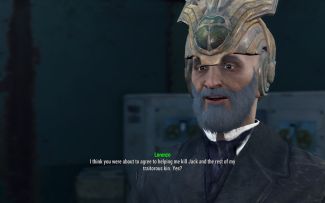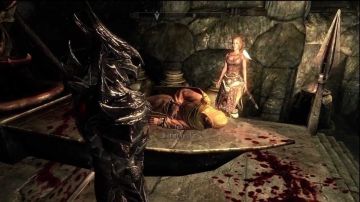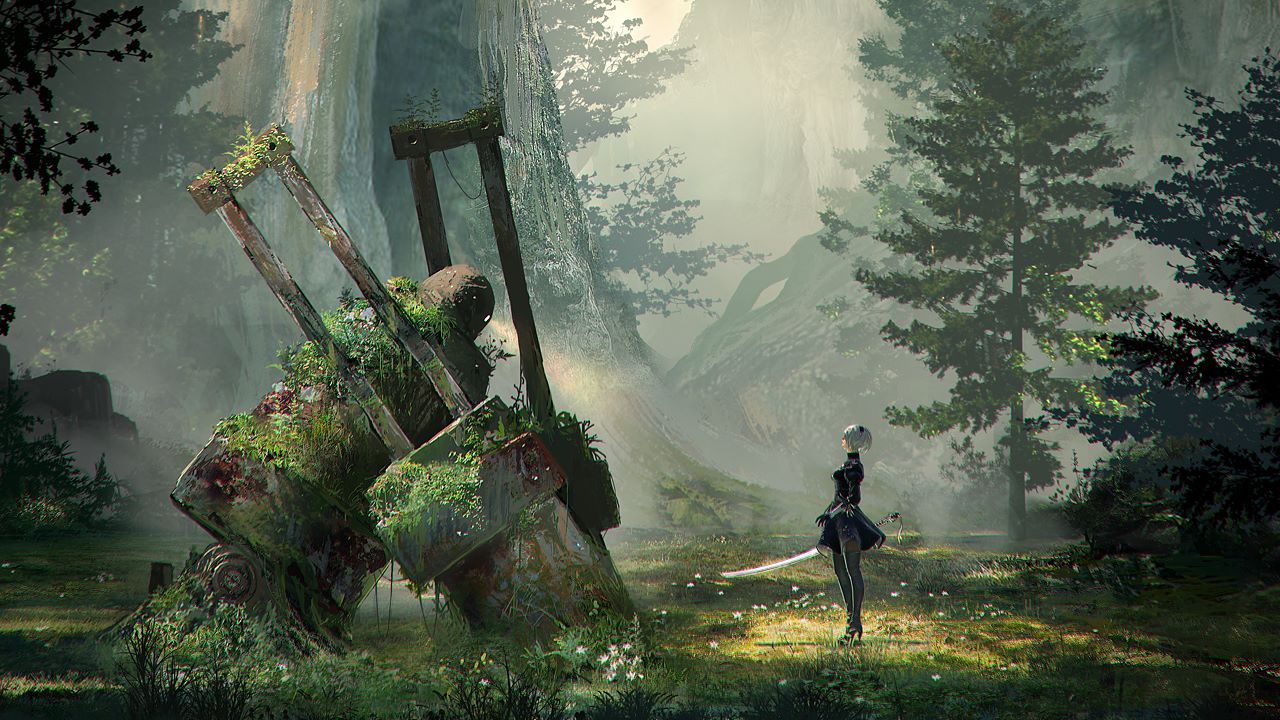Trending
Opinion: How will Project 2025 impact game developers?
The Heritage Foundation's manifesto for the possible next administration could do great harm to many, including large portions of the game development community.
A look at why moral choices in games often don't feel impactful, and how they can be done better.


The following article is a reproduction, and has been modified for this site. The original article, and many more, can be found at RemptonGames.com
Hey everybody! No new article this week because I had to move to a different state, but fear not! News and new content will be coming very soon. In the mean time, please enjoy this article, which was originally posted on February 2nd, 2019!
One of the things that defines a game is the choices that it presents to its player. Every game has choices, from deciding whether to fold your hand of cards to choosing which cybernetic enhancements to buy for your giant mech suit. However, one type of choice that this medium has difficulty presenting is moral choices.

The teeth are fine, but where do I add a working jaw?
Don’t get me wrong, there are plenty of games that present the player with moral decisions to make. However, due to the nature of the medium of games most players don’t really think about these choices the way they are meant to be thought about. In any game players tend to do what gives them the best chance of winning, and this can lead to them making these decision based for gameplay reasons, not moral reasons.
In many cases this is fine – these are just games after all, and for the most part the player should be encouraged to do what is most fun for them. However, in some cases games can be far more than just fun. Games are a unique medium with the power to place players in situations they would never encounter in their real lives, and force them to make difficult decisions that they never would otherwise have to make. These choices can be extremely powerful, but only if they are implemented correctly.
In this article I am going to examine moral decisions in games. I am going to look at various ways they have been implemented in the past, why they often do not work, and what is necessary to make these types of choices work.
The first type of moral choice system I want to look at is the “morality meter” system. These are systems that explicitly and visibly track the player’s morality along a 1 dimensional axis with “good” on one side and “evil” on the other. As the player progresses through the game their choices will move their position along this axis until they are “fully good” or “fully evil”.
Examples of this type of system include Star Wars: Knights of the Old Republic, Shadow the Hedgehog, and Super Smash Bros. Ultimate. In Knights of the Old Republic the player has a meter that shows their progress towards the light or dark side of the force, and based on their alignment they can unlock various powers and abilities. In Shadow your alignment will move you along different story paths, and in Smash (spoilers) who you choose to fight (light or dark spirits) can determine which ending you eventually get.

If only it was a little less ambiguous…
Other games are a little less obvious with their moral choices. Instead of presenting you with clearly good and bad choices, they present the players with less clear-cut choices, and allow them to choose the one they believe in the most. This is common in the Fallout series, where the player has the options of joining various factions that have different moral stances, and it is up to them to choose the group that aligns with their beliefs.
In Fallout 4, for example, players are given choices between the Railroad which wants to free Synths, the Brotherhood of Steel which wants to destroy them, and the Institute which wants to capture and reprogram them to be humble servants. There is no clear “good” or “bad” among these choices – it all depends on the player’s own ideas about concepts about consciousness and free will.
Another way games can get a little more ambiguous is by not directly telling the players about their various options, and making the effects that their choices have a little harder to track. An example of this would be in Detroit: Become Human, with the “violent” and “pacifist” paths. The game lets you know what actions move you along this meter, but it is difficult to know exactly where you are at any given time because it doesn’t present you with a clear “pacifism” meter that clearly shows your exact score at any given time.
While games are amazing at providing players with choices, it becomes a little more complicated when you begin to talk about the idea of moral choices. A moral choice comes down to deeply held internal beliefs about right and wrong, and in the real world moral choices can become quite messy and complicated. Moral choices in the real world always have consequences, the outcomes may not always be clear, and they cannot be undone.
In a game, however, this is not the case. In general, any choice you make in a game can be undone. If you get an outcome you don’t like, you can always load up an old save file and go back before you made the choice. The outcomes are also known – it is entirely possible to look up a walkthrough online that will tell you exactly the outcomes of any choices that you make, but in the real world things are less clear.
The biggest difference, however, is that choices you make in a game are unlikely to have real-world consequences (other than potentially affecting your relationship with other players in a multiplayer game). Even if I make a choice in a game that permanently kills a character, and the game automatically saves so that the choice cannot be undone, my real life has not been affected. That character never really existed, and nobody was actually harmed or helped based on my actions.
Given all of this, it is very rare for me to play a game that actually makes me think deeply about the possible moral choices that I have to make. In the end, the choice often comes down to which outcome is best for the character within the game rather than any sort of strong moral conviction. Basically, if an NPC asks me to murder a nun to win a cool unique weapon, that nun never had a chance.

Help you murder your family so I can inject your magical blood? Count me in!
There are so many factors that get in the way that it begs the question – is it even possible for a game to present true moral choices to the player? Is it possible for a game to actually require you to look inside yourself and examine your own beliefs to make a decision, even if it may have a negative effect on gameplay? I think it is possible, but there are numerous factors that must be taken into account.
The first question we must answer is this – what counts as a moral choice? Games present players with decisions all the time, but most of them would be considered tactical decisions, not moral ones. Take the Pokemon series for instance. Choosing which Pokemon or attack to use can be a difficult decision, but it has no moral implications.
Even the decision of whether to fight at all has all semblance of morality removed from it – you need to fight to progress the game. If you need to level up, you will fight more enemies. If you are already overlevelled you are more likely to run away from battles, but generally this is for gameplay reasons, not moral ones.
If these types of decisions clearly have no moral bearing, what does? In Skyrim there is a quest in which players are introduced to a clan of cannibals and asked to join them by feasting on a priest. Is this considered a moral choice? On the one hand, this decision seems to have a clear right and wrong – murder and cannibalism is wrong, so you shouldn’t do them. If that was all there was to it the choice would be easy – don’t kill the priest.
However, there are a number of factors that make this type of choice a bad example of moral decision making. First, it doesn’t really force the player to examine their own beliefs because it’s very clear which option is right and which is wrong. Secondly, it incentivizes players to make the immoral decision. If the player eats the priest they are presented with a unique ring, while if they don’t they will have to fight all the cannibals. Therefore, the player is strongly incentivized to kill the priest.

Skyrim: Where killing 1 priest instead of a dozen shopkeepers is the “evil” choice
This turns the decision into a very different kind of choice – do what I know is right, or do what will help me in the game. The problem is, players are given very little reason to make the “right” choice. It is pretty much impossible to play Skyrim without murdering hundreds or thousands of people, elves, monsters and undead, to the point that it would be almost hypocritical to try to treat this behavior as “wrong”. In fact, in order to escape from this situation without murdering the priest the player will likely have to kill numerous other NPCs, several of which are useful merchants in the game. Couple that with the fact that we have no reason to feel any connection to this particular character and the choice becomes clear.
I believe that these examples show two things. Firstly, that if you are asking a player to make a moral choice you should present them with a choice that actually requires them to examine their own morals. The choice should not have a clear right and wrong answer, but should make them choose between two rights or two wrongs. Ideally there should be reasonable arguments for both sides, and the player will have to really examine themselves to make a decision.
Secondly, the player should not make the choice for gameplay-only reasons. If you are trying to make the player really examine their own ethics, bribing them with in-game incentives is only going to muddle the decision. If the player is incentivized within the game to choose one way this will detract from the decision that has to be made, and possibly result in a choice that doesn’t reflect their true beliefs.
This is not to say that the decision cannot have implications within the game. In fact, I would consider your choice having a significant impact to be a positive thing – the more significant the impact, the more likely the player is to seriously consider the choice. All I am saying is that gameplay factors should not be the primary driving force behind the decision.
However, if you truly want to impact the player you should try to make the choices have as significant an effect on the real world as possible. Players often don’t care about making these types of moral decisions in games because it doesn’t feel real to them – no matter what they do there are no real consequences to them.
In fact, it is extremely common to save before a major choice so that you can go back and either experience both choices or just change your decision if you made the “wrong” one. This lack of consequence removes all stakes from the choice, and in the end it becomes pretty much meaningless.
There is very little that a game can do to add stakes back into these types of decisions, but one thing that they can take is the player’s time. I think one way to add significance and impact to moral decisions in games is to make them irreversible and permanent. Once the player makes the choice the game is saved and they cannot go back or change their decisions.
This may seem extreme, and is definitely not necessary for every game. However, if you want your decisions to have real impact I think this is a very effective option, because it has real consequences for the player. Sure, they can still go back and change it if they want, but it would require them to start over from the beginning. This is very time consuming and most players would avoid it, which would cause them to put much more weight on their choice.

It’s pretty much all spoilers ahead
One great example of a truly difficult moral decision can be found at the end of Nier: Automata. This game has multiple endings, but in order to unlock the final ending you must face an extremely difficult bullet-hell style boss battle during the end credits of the game.
However, if you struggle enough during this battle you are presented with an option of receiving assistance from players who have already beaten the game. This makes the fight much easier, and by completing this sequence you are able to unlock the final ending. After completing this sequence, the player is given a final choice – they can help somebody else in the world with that final boss battle, but in return their save file will be deleted.
This is a truly difficult decision, with real moral implications. The impact and consequences of this choice will have a real effect on the world. If you say yes your ship will help someone, somewhere in the world, finish this game. However, it is likely to be somebody you have never met, and in order to do so you will have to give up a save file that you have poured dozens of hours into. Is it worth it? That’s up to you to decide.
Of course, not every decision you make in game can or should be this impactful. However, it is a great example of how even in a game you can make a choice that has real moral implications, and is one that will not be taken lightly.
That is all I have for this week. If you enjoyed this article, check out the rest of the blog and subscribe on Facebook, Twitter, or here on WordPress so you will always know when I post a new article. If you didn’t, let me know what I can do better in the comments down below. And join me next week, where I will look at how to Yomi in games!
Read more about:
BlogsYou May Also Like